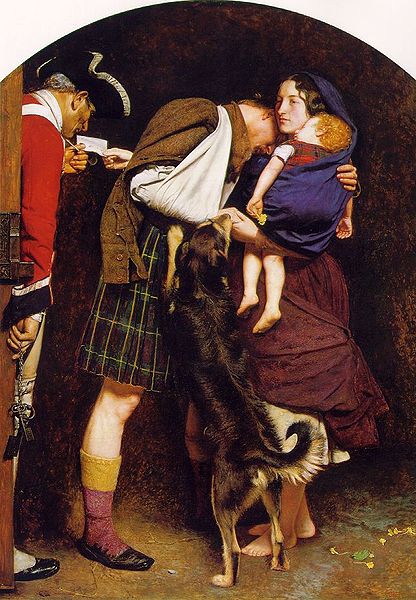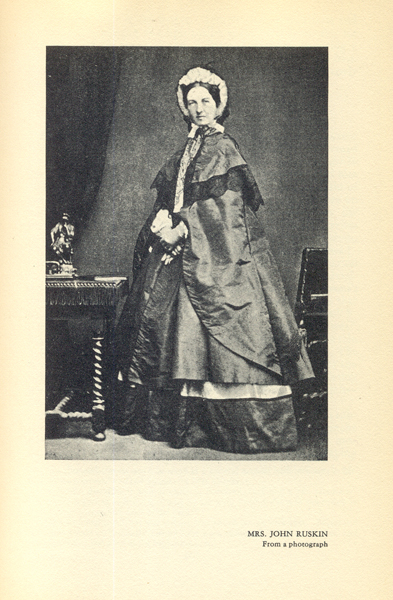John Ruskin was an an author, art critic, and social reformer who was an early champion of Pre-Raphaelite ideals. Interestingly, he was also the patron who supported the work of Elizabeth Siddal.
His marriage to Euphemia Chalmers Gray, known as Effie, is universally described as a disaster. The story goes that Ruskin rejected Effie on their wedding night on the premise that he was shocked by her appearance. The most pervasive version of the story is that he was shocked by the sight of her pubic hair, an aspect of the female form hitherto unseen by the inexperienced Ruskin. Though this tale persists, it should be noted that this is an uncorroborated conjecture that has fallen into lore. Kirsty Stonell Walker addresses this in her blog post Playing Ruskin’s Advocate at The Kissed Mouth. Their marriage remained loveless and without physical interaction. Effie wrote to her father, “He alleged various reasons, hatred to children, religious motives, a desire to preserve my beauty, and, finally this last year he told me his true reason… that he had imagined women were quite different to what he saw I was, and that the reason he did not make me his Wife was because he was disgusted with my person the first evening 10th April.”
Ruskin was a supporter of the Pre-Raphaelite Brotherhood and formed a friendship with artist John Millais. Effie appears in his painting The Order of Release and perhaps it was then that feelings for each other were born. The trio later traveled to Scotland so that Millais could paint Ruskin’s portrait. In a move that shocked Victorian society, Effie abandoned her travesty of a marriage to pursue happiness with Millais.

It was a shocking scandal. All of the details of Effie’s marriage were made public and she was even forced into the humiliating experience of having a doctor confirm her virginity. I think that her later life was a happy one. She and Millais had eight children and settled into a loving family life. Sadly, though, her annullment resulted in Effie’s becoming socially ostracized and was no longer invited to may social functions.
Effie’s saga is being revisited through Emma Thompson’s latest film project. And like Effie’s life, it is not without scandal. Plagiarism accusations have been leveled towards both Thompson and her husband, Greg Wise. Also surprising is the casting of Effie’s role, to be portrayed by American Dakota Fanning instead of the obvious choice of a British actress. This is not the first time the affairs of Ruskin, Effie and Millais has played out on the big screen. A silent film, The Love of John Ruskin, was produced in 1912.
The strange relationships of John Ruskin do not end with Effie. He later had an obsessive relationship with a very young Rose La Touche, whom he met when she was nine. Nine. Yes, that is definitely material for a future post.


Great post but as a biased Ruskin supporter can I just point out that I don’t think any modern scholar would agrees about the reason you give for his celibacy.
http://www.guardian.co.uk/film/2010/mar/14/john-ruskin-wedding-effie-gray
.
Thanks for the article Philip! I do wonder if the comments made to Effie about her body and their wedding night were his actual feelings or just something he said to hurt her. The complexity of the situation is difficult to understand. And then I wonder if, given his later infatuation with Rose La Touche, perhaps he was attracted to a different type of figure entirely and just had no interest in Effie. And the observation in the article that “… Ruskins’ wedding night is a symptom of the universal problem of the difference between an idealised image and reality.” Is probably very astute. I actually like Ruskin and especially love his thoughts on Gothic architecture.
Ruskin should never have married, and his relationship with Rose LaTouche was even more crazy.
If Ruskin had a fear of intimacy then he never should have married but remained a bachelor. Get a dog if you want a companion. He brought this whole situation on his head and if he suffered the consequences, so what. I have very little sympathy for a man who marries a woman and has any concerns about being intimate with her. He knew what Victorian society was like and how the lady still ends up taking the blame. I really do not care what he wrote or how brilliant people thought he was, to me he is nothing but a jerk who did not know himself very well. I am finding that there is not much romance in Victorian times or any time in history. I think this whole incident just shows how women were unjustly treated by a culture and law system where men had the upper hand, even if they were totally wrong. How you treat other people says a lot more about your character than anything you have to say on Gothic architecture. And that includes how you treat animals. Sorry for the rant, but I am sick of women being treated as saints, idealized in some way, or treated like idiot children who have to have men think for them. And these attitudes still exist today in parts of the world. It takes away our humanity and treats us as less than equals with men. I would rather have an equal paycheck to a man than hear a lot of nonsense about being put on a pedestal and admired from afar. Sorry Victorian painters, I want money for having to pose for you and not bedroom privileges. Too bad those ladies did not know or even think they had any choices.
Oh Lisa, I know exactly how you feel. Sometimes it is easy to separate an artist’s work from their personal life and choices and sometimes it is impossible. It was such an unjust culture. I loved your comment.
Kirsty wrote a very interesting post once about whether or not we can or should view an artist’s work as separate. http://fannycornforth.blogspot.com/2011/10/not-in-public-interest.html
Can’t wait for the new Ruskin movie on this interesting love triangle relationship!!
I think it is harder to see an artist as separate from their work when you have nieces who are 17 and 18. When they were very young, my sister did not even watch the news because of all of the violence. They played with dolls and loved Disneyland. They were not allowed to dress inappropriately (the school dress code took care of a lot of that). So when I think of how they are beginning to like boys and talk about them, I guess I am even more appalled at how Effie was treated. To think that she had to stay married to a man who told her there was something wrong with her. That is an abusive relationship and then she gets the blame. GRRRR! I just can not respect any man who could do that to a woman. If you do not have respect for someone, it is hard to not have a bias against their opinions on other areas. Give me 50 years and I may lose the urge to call him names which I shall not print here. Or maybe 70 to be on the safe side.
Effie’s story is told in my triple biography: ‘Effie: A Victorian Scandal’, now in e-book form, and soon to be in paperback.
Effie Millais has always been one of my hero. I’m an black woman that loves her story and what she had to endure. Thanks for all the information on her and Alexa Wilding.
Hello: this is a very interesting blog !!!! <3